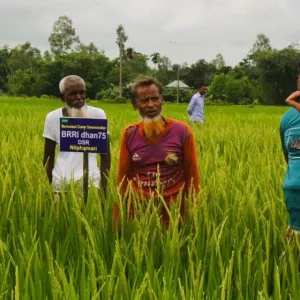Advancing direct-seeded rice technology in northern Bangladesh through mechanized clustered demonstration
Muhammad Ashraful Habib, Swati Nayak, Nuruzzaman, Saidul Islam, and Amaresh Chandel Agriculture is the backbone of rural communities in Bangladesh, where farming employs more than 60% of the population. Farmers have been cultivating their lands using plenty of work, water, and expense. As rice is the staple food of Bangladesh, rice farming has a distinct place among the numerous

Advancing direct-seeded rice technology in northern Bangladesh through mechanized clustered demonstration
Muhammad Ashraful Habib, Swati Nayak, Nuruzzaman, Saidul Islam, and Amaresh Chandel
Agriculture is the backbone of rural communities in Bangladesh, where farming employs more than 60% of the population. Farmers have been cultivating their lands using plenty of work, water, and expense. As rice is the staple food of Bangladesh, rice farming has a distinct place among the numerous forms of agriculture, including fish farming, raising livestock, and cultivating crops. Given that rice farming provides food for millions of people, its contribution to reducing the country’s food shortfall cannot be overstated. However, several socioeconomic and environmental issues are working together to undermine this lifeline more and more.
Groundwater depletion: The erosion of vital resources in the northern regions
Although rivers encircle the country, Bangladesh has experienced a consistent decline in groundwater levels over time. There are several reasons for this loss, but two of the most important ones are natural disasters like droughts and floods and the detrimental impacts of climate change on the ecosystem in the area. The highlands of northern Bangladesh, especially the divisions of Rangpur, are where the problem is most noticeable. Water, the most important resource for growing rice, is becoming more difficult to obtain and more expensive, putting farmers in these areas—who are already struggling with resource constraints—at a crossroads.
The promise of direct-seeded rice (DSR) technology
DSR technology is an innovative approach that can potentially transform the rice farming industry. DSR reduces the requirement for fields to be continuously flooded, unlike the transplanting method. It reduces labor and water usage by up to 50%, conserving resources (Marasini et al., 2016). This technical breakthrough offers promise for farmers who are increasingly battling resource depletion and climate change. DSR eliminates the need to transplant seedlings from a nursery and…

